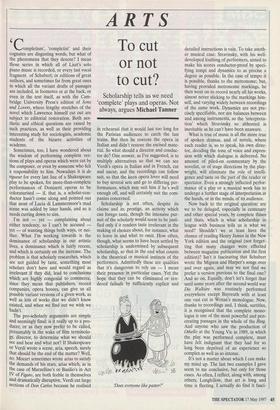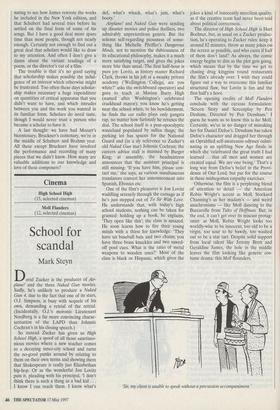ARTS
To cut or not to cut?
Scholarship tells us we need `complete' plays and operas. Not always, argues Michael Tanner
Completism', `completist' and their cognates are disgusting words, but what of the phenomena that they denote? I mean those series in which all of Liszt's solo piano music is recorded, or every last vocal fragment of Schubert; or editions of great authors, and sometimes far from great ones in which all the variant drafts of passages are included, in footnotes or at the back, or even in the text itself, as with the Cam- bridge University Press's edition of Sons and Lovers, where lengthy stretches of the novel which Lawrence himself cut out are subject to editorial restoration. Both aes- thetic and ethical questions are raised by such practices, as well as their providing interesting study for sociologists, academic students of the bizarre activities of academe.
Sometimes, too, I have wondered about the wisdom of performing complete ver- sions of plays and operas which were cut by the composer, or even by someone who felt a responsibility to him. Nowadays it is de rigueur for every last line of a Shakespeare play to be spoken, for more-than-complete performances of Donizetti operas to be coloraturised — if, that is, a scholar-con- ductor hasn't come along and pointed out that most of Lucia di Lammermoor's mad scene was added by later hands, and so it needs cutting down to size.
I'm not — yet — complaining about either tendency, so I can't be accused yet — of wanting things both ways, or nei- ther. What I'm working towards is the dominance of scholarship in our artistic lives, a dominance which is fairly recent, and which is certainly on the increase. The problem is that scholarly researches, which are not guided by taste, something most scholars don't have and would regard as irrelevant if they did, lead to conclusions which are highly congenial to commerce, since they mean that publishers, record companies, opera houses, can give us all possible variant versions of a given work, as well as lots of works that we didn't know existed, and when we find out we wish we hadn't.
The pro-scholarly arguments are simple and seemingly final: is it really up to a pro- ducer, or as they now prefer to be called, presumably in the wake of film terminolo- gy, director, to determine what we should see and hear and what not? If Shakespeare or Verdi wrote a scene, aria, speech, surely that should be the end of the matter? Well, no. Mozart sometimes wrote arias to satisfy the demands of his stars, arias which, as in the case of Marzelline's or Basilio's in Act IV of Figaro, are both feeble in themselves and dramatically disruptive. Verdi cut large sections of Don Carlos because he realised in rehearsal that it would last too long for the Parisian audiences to catch the last trains. But then he rewrote the opera in Italian and didn't restore the excised mate- rial. So what should a director and conduc- tor do? One answer, as I've suggested, is to multiply alternatives so that we can see Verdi's opera in Italian and in French, cut and uncut; and the recordings can follow suit, so that the keen opera lover will need to buy several sets and go to differing per- formances, which may suit him if he's well enough off, and will certainly suit the com- panies concerned.
Scholarship is not often, despite its claims and its prestige, an activity which can forego taste, though the intensive pur- suit of the scholarly would seem to be justi- fied only if it renders taste irrelevant in the making of choices about, for instance, what to leave in and what to omit. How often, though, what seems to have been settled by scholarship is undermined by subsequent scholarship, so that in the end what counts is the theatrical or musical instincts of the performers. Admittedly these are qualities that it's dangerous to rely on — I mean their presence in particular cases. Yet the hope that they can be eliminated or ren- dered failsafe by sufficiently explicit and Does everyone like pastor?' detailed instructions is vain. To take anoth- er musical case: Stravinsky, with his well- developed loathing of performers, aimed to make his scores conductor-proof by speci- fying tempi and dynamics to as precise a degree as possible. In the case of tempo it is possible, thanks to the metronome; but, having provided metronome markings, he then went on to record nearly all his works, almost never sticking to the markings him- self, and varying widely between recordings of the same work. Dynamics are not pre- cisely specifiable, nor are balances between and among instruments, so the `interpreta- tion' which Stravinsky so abhorred is inevitable as he can't have been unaware.
What is true of music is all the more true of spoken dramas, and of novels, where each reader is, so to speak, his own direc- tor, deciding the tone of voice and expres- sion with which dialogue is delivered. No amount of piled-on commentary by the novelist, or of stage directions by the play- wright, will eliminate the role of intelli- gence and taste on the part of the reader or spectator. Even a strongly inflected perfor- mance of a play or a musical work has to undergo a further stage of interpretation at the hands, or in the minds, of its audience.
Now back to the original question: are we to be deluged, especially in centenary and other special years, by complete thises and thats, which is what scholarship in league with business tells us is what we need? Shouldn't we at least have the chance of reading Henry James in the New York edition and the original (not forget- ting that many changes were effected between magazine publication and the first edition)? Isn't it fascinating that Schubert wrote the Mignon and Harper's songs over and over again, and may we not find we prefer a version previous to the final one? And so on. Equally, don't let's forget that until some years after the second world war Die Walkiire was routinely performed everywhere except Bayreuth with at least one vast cut in Wotan's monologue. Now, thanks to recordings and, I think, surtitles, it is recognised that the complete mono- logue is one of the most powerful and pen- etrating passages in the whole of the Ring. And anyone who saw the production of Othello at the Young Vic in 1989, in which the play was performed complete, must have felt indignant that they had for so long been deprived of an experience so complex as well as so intense.
It's not a matter about which I can make my mind up. The last two examples I gave seem to me conclusive, but only for those cases. As often, I reflect, along with, among others, Longfellow, that art is long and time is fleeting. I actually do find it fasci- nating to see how James rewrote the works he included in the New York edition, and that Schubert had several tries before he settled on the final form of some of his songs. But I have a good deal more spare time than most people, though not nearly enough. Certainly not enough to find out a great deal that scholars would like to draw to my attention. And often I don't give a damn about the variant readings of a poem, or the director's cut of a film.
The trouble is that it's no good saying that scholarship makes possible the indul- gence of an interest which otherwise might be frustrated. Too often these days scholar- ship makes necessary a huge expenditure on quantities of critical apparatus that you didn't want to have, and which intrudes between you and the work you wanted in its familiar form. Scholars do need taste, though I would never trust a person who became a scholar to have it.
A last thought: we have had Mozart's bicentenary, Bruckner's centenary, we're in the middle of Schubert and Brahms year. All these except Bruckner have involved the performance and recording of many pieces that we didn't know. How many are valuable additions to our knowledge and love of these composers?



































































 Previous page
Previous page